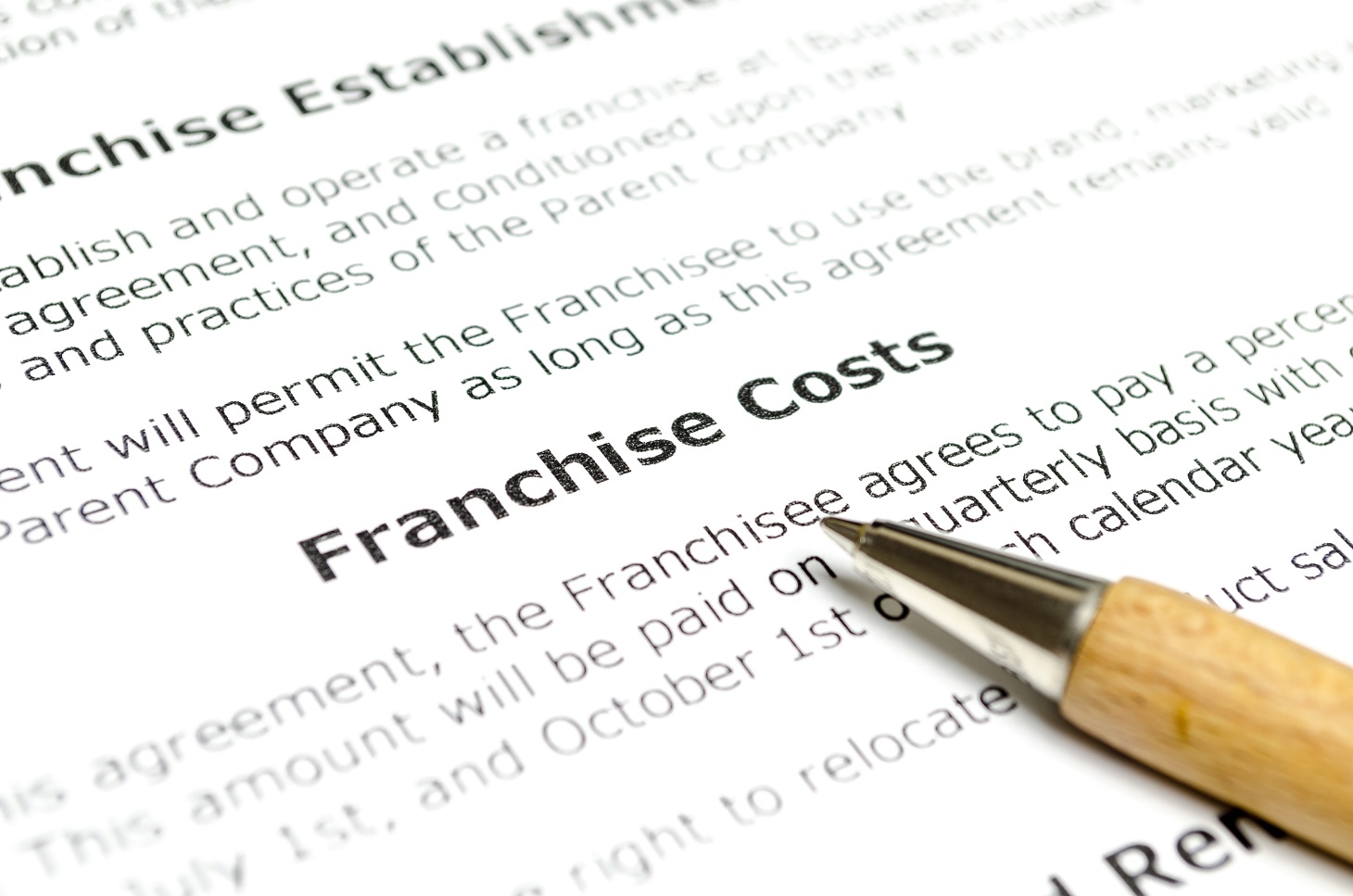Ready to Embark on an Exciting Journey with WIN?
Take the first step toward personal and financial freedom by filling out the interest form. One of our franchise advocates will be in touch with you soon!

The allure of owning a franchise is understandable—after all, the blueprint for success is already laid out for you. You’re not just starting a business from scratch but rather stepping into a proven business model, complete with a recognizable brand, marketing support, and operational guidance.
It’s like buying a house that’s not just built but fully furnished and functional, making it easy for you to move in and call it home. However, just like any home comes with maintenance costs and utility bills, a franchise comes with its own set of costs. Understanding these costs is critical for anyone considering taking the franchise route to business ownership.

The franchise fee is essentially your ticket of entry into the franchise system. This one-time upfront cost grants you the license to operate under the franchise’s name and benefit from its business model, support, and branding. Franchise fees can vary widely, depending on the popularity and scale of the franchise, but expect to pay anywhere from a few thousand dollars to several hundred thousand dollars.
Once you’ve paid your franchise fee, you’re often required to complete a training program to learn the ins and outs of the business. While some franchises include this in the initial fee, others charge separately for training. Training costs can include not just the actual training program, but also travel and living expenses if the training center is not local.
Licensing costs are separate from the franchise fee and encompass the expenses associated with obtaining the required permits and licenses to operate your business. This could include anything from local business licenses to specialized permits, depending on the nature of the franchise.
Before you sign a franchise agreement, it’s advisable to consult legal and financial advisors who specialize in franchising. This consultation is to ensure you understand all terms and conditions as well as any financial implications. Legal and accounting fees can quickly add up, so make sure to budget for them.
The location is a significant factor in the success of most franchises. Whether it’s a fast food chain drive-thru or a retail store, the real estate costs—such as lease payments, utility hook-ups, and renovations—can be substantial. Some franchises have specific location guidelines, and you may need to spend extra to conform to these.
Setting up your franchise will also mean stocking up on initial inventory or purchasing the required equipment. The costs can vary significantly depending on the type of business. For instance, a restaurant will need a full kitchen setup, whereas a retail store will require shelving, registers, and possibly a point-of-sale (POS) system.
It’s worth noting that not all franchises require a brick-and-mortar location. Some service-based businesses, such as home inspection businesses, can be operated out of your home, significantly reducing the initial real estate and inventory costs. Opting for a home-based franchise can be a more economical entry point for those looking to dip their toes into the franchise world without committing substantial capital upfront.

Running a franchise involves more than just the initial investment. The journey is filled with ongoing costs that can fluctuate depending on a variety of factors, from the industry you’re into the level of support provided by your franchisor. Here, we break down the most common operational costs you’ll need to prepare for.
Arguably one of the most prominent ongoing costs of a franchise, the royalty fee is a percentage of your gross income that you pay to the franchisor. This fee is for the continued use of the franchise’s name, business model, and support services. Rates can vary but usually range between 4% to 10% of gross sales, depending on the franchise agreement.
In addition to royalty fees, most franchises require franchisees to contribute to a national or regional advertising fund. Like the royalty fee, this is often a percentage of your gross sales. The purpose is to pool resources for larger, more impactful advertising campaigns that benefit the brand—and by extension, your business!
While the advertising fee contributes to broad-scale promotions led by the franchisor, you’ll likely need to invest in local marketing to drive traffic to your specific location. This could include anything from social media ads and local SEO to print flyers and community events.
Business insurance is a non-negotiable cost. You’ll need various types of insurance, including liability, property, workers’ compensation, and perhaps even specialized policies tailored to your industry. These premiums will be a consistent part of your operating budget.
If you operate out of a commercial space, rent is another recurring expense. The cost can fluctuate greatly depending on the location and the size of the property. Additionally, you’ll likely have to cover utility costs such as electricity, water, and internet.
Franchise agreements are not indefinite; they come with expiration dates. When the term comes to an end, you’ll have the option to renew your franchise for another term, which usually involves a renewal fee. This is often less than the initial franchise fee but still constitutes a cost to keep in mind for long-term planning.
As with initial costs, choosing a home-based franchise offers distinct advantages in terms of operational expenses. Rent and associated utility costs are significantly reduced or eliminated when you operate from your home. A home-based service business, like home inspection, can save you a substantial amount in ongoing costs, making it an attractive option for those with budget constraints or a desire for a lower-risk investment.
While entering the world of franchising requires a significant financial commitment, it’s crucial to remember that you’re not navigating these waters alone. The franchisor offers a raft of resources, tools, and support systems designed to get your business off the ground, minimize uncertainties, and maximize your chances for long-term success. Below, we explore some key areas where the franchisor’s support proves invaluable.
When you buy into a franchise, you’re not just buying the right to use their name; you’re buying into an entire ecosystem that includes extensive training programs. Whether it’s week-long training at the corporate headquarters or ongoing educational resources, the franchisor provides in-depth training to help you and your staff understand the business inside out. This support drastically reduces the learning curve and helps you operate more efficiently from day one.
Franchisors often have established marketing platforms and strategies that have been tested and proven to be effective across multiple locations and demographics. This helps you attract and retain customers without having to experiment with various marketing techniques, thereby saving time and resources. From national advertising campaigns to local marketing materials, the franchisor’s marketing support helps elevate your business visibility and customer engagement.
From inventory management to quality control, the franchisor often provides software tools and systems that simplify day-to-day business operations. The goal is to offer you a seamless and streamlined process, reducing both the effort required and the margin for error. This operational support is especially beneficial for those new to running a business, serving as a safety net that helps ensure a smooth operation.

One of the most important advantages of opting for a franchise is the strength of an established brand. Customers are more likely to opt for a name they recognize and trust. This pre-established customer loyalty can translate into more consistent revenue streams and may even grant you a competitive edge in your market.
Franchises come with a ready-made business model that has proven to be effective. Whether it’s a pricing strategy, supply chain management, or sales techniques, the franchise model is designed to be replicable for each franchisee. The franchise model reduces the risk that comes with starting a business from scratch, as you are adopting a tried and tested system that has already shown it can be profitable.
While the franchisor provides a wealth of support and a proven business model, the onus for maximizing returns ultimately falls on you, the franchisee. Here, we explore strategies to manage and potentially reduce costs while boosting your overall return on investment (ROI).
One of the advantages of being part of a franchise is the ability to leverage group purchasing power. Franchisors often negotiate deals with suppliers for lower prices on goods and services, which you wouldn’t be able to secure as an independent operator. Take full advantage of these discounted rates to reduce your operational costs.
Overstocking can lead to increased holding costs, while understocking can result in lost sales. Use the inventory management tools provided by your franchisor or invest in one yourself to ensure you’re neither overstocking nor running out of essential items.
To manage your finances efficiently, you need to understand them thoroughly. Consider monthly or quarterly financial audits to identify trends, spot inefficiencies, and evaluate your ROI. This kind of routine check-up allows you to make data-driven decisions, helping to both manage costs and identify profitable opportunities.
While franchisors often lead national or regional marketing campaigns, local marketing is usually up to you. Use social media, local events, and partnerships with other local businesses to make your franchise known in your community. Local marketing can often yield a high ROI, given that it’s targeted and generally less expensive.
Labor costs are often one of the highest recurring expenses for any business. Use staff scheduling software to ensure you are neither understaffed nor overstaffed. Being smart about how your schedule can lead to significant cost savings without affecting customer service.
Acquiring a new customer is generally more expensive than retaining an existing one. Implement customer loyalty programs and offer excellent customer service to keep people coming back. A loyal customer base can significantly boost your ROI in the long run.
The business landscape is ever-changing. What worked last year, or even last month, might not work today. Continuously monitor your business performance and be willing to adapt your strategies as needed. Keeping an eye on your KPIs (Key Performance Indicators) can help you stay on top of your business and make informed decisions.
If your franchise model allows it, consider transitioning to or starting with a home-based business model to save on real estate and utility costs. This lower-overhead approach can help you achieve profitability more quickly, maximizing your ROI sooner rather than later.
Starting and operating a franchise is an exciting venture that offers numerous benefits, including a proven business model, established brand recognition, and invaluable support from the franchisor. However, it also requires a significant financial investment, both upfront and ongoing. From initial costs like franchise fees, training, and equipment to recurring expenses like royalty fees, advertising contributions, and operational costs, understanding the full financial picture is crucial for any aspiring franchise owner.
For those interested in a franchise opportunity that offers lower start-up costs without compromising on support or brand recognition, a home-based service franchise like home inspection may be an ideal choice. And if you’re looking for the best in the business, WIN Home Inspection stands out as the #1 ranked home inspection franchise, boasting the industry’s largest support team. WIN offers the most comprehensive training programs, an end-to-end marketing platform, and ongoing operational support, setting you up for success from day one.

If you’re eager to explore the exciting opportunities that owning a WIN Home Inspection franchise can offer, don’t hesitate to reach out. Submit the interest form to learn more about how you can start your journey with a franchise that’s committed to your growth and success.
Take the first step toward realizing your dream of owning a successful business. Your future starts now, and WIN Home Inspection is here to guide you every step of the way.